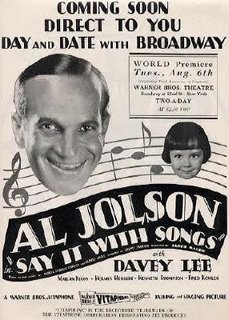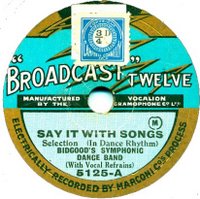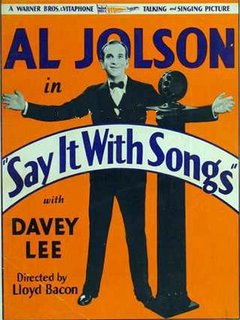Al Jolson's 1929 film "Say It With Songs" is often overlooked in the usual rush to explore "The Jazz Singer," to generally ignore the magnificent "The Singing Fool" (1928), and to condemn "Mammy!" and "Big Boy" (1930) for crimes that, when you get right down to it, primarily exist only within the minds of the present day viewer.
While I'm not overly keen on Mr. Jolson's output, which can often be akin to the experience of being repeatedly poked in the shoulder by a loud, over-bearing boisterous fellow puffing a cheap cigar, try as you might there's no way to ignore the historical importance of his early films nor to admit, even reluctantly, that they were all wildly popular with audiences of the day.
Although "Say It With Songs" didn't perform as well for Warner Bros. as hoped, what film that was to follow "The Singing Fool," box-office behemoth that it was, possibly could? Lacking the novelty impact that his first two Vitaphone films had, and without the addition of two-strip Technicolor sequences that "Mammy!" would feature, "Say It With Songs" didn't create much of a ripple upon release during a period when audiences and critics alike were saturated with musicals. Then too, without a single black face moment, there's nothing worthwhile in the film for those today seeking to pick Jolson apart, fashionable though that has become.
Indeed, the entire uncomfortable black face aspect is likely the only reason his films have yet to receive the DVD presentation they're certainly due, and that the recent glorious Technicolor restoration of "Mammy!" is curiously absent from TCM as are most of Jolson's films. The problem isn't within the films, it's within ourselves --- and if so, how disgraceful then that plans for an 80th Anniversary DVD edition of "The Jazz Singer" fell victim to a woeful lack of common sense and backbone.
When "Say It With Songs" does manage to surface, what we see is a surprisingly small, somewhat improbable melodramatic production interspersed with songs as performed by the lead character, a radio singer. No production numbers, dancing girls, night-club scenes. The film never "opens up" in the way his earlier films do, and seems almost claustrophobic by comparison. Without Jolson's presence, and the few melodies the film contains, it's really little different from similar products being churned out by Warners and other studios of the day --- and precisely the same sort of plot that could have formed a vehicle for Richard Barthelmess (had not he already trod much the same territory in 1929's part-talkie "Weary River") or nearly any other screen name of the period you can think of, save perhaps for Joe E. Brown or El Brendel.
Despite the film's shortcomings --- chief among them a basically absurd plot and the negligible contributions of child actor Davey Lee (who's dialogue, especially during a critical court-room scene, is largely unintelligible), there's many a pleasure to be found within "Say It With Songs." From the clever opening montage of various radio performers, to the always delightfully velvet yet undeniably oily tones of actor Kenneth Thomson, the serenely lovely (and vastly under-utilized) Marion Nixon, and Jolson himself --- as relaxed, low-key, unfailingly good humored and naturalistic an Al Jolson as you're likely to see in any of his films. So then, if you're already a fan of Jolson you don't need any further selling --- and if you've never encountered him, then this is probably the least jarring vehicle with which to do so.
unintelligible), there's many a pleasure to be found within "Say It With Songs." From the clever opening montage of various radio performers, to the always delightfully velvet yet undeniably oily tones of actor Kenneth Thomson, the serenely lovely (and vastly under-utilized) Marion Nixon, and Jolson himself --- as relaxed, low-key, unfailingly good humored and naturalistic an Al Jolson as you're likely to see in any of his films. So then, if you're already a fan of Jolson you don't need any further selling --- and if you've never encountered him, then this is probably the least jarring vehicle with which to do so.
Careful viewing of the film reveals that one sequence, from early on in the film, lasting approximately seven minutes, is absent from seemingly all circulating prints. The tune "I'm Ka-Razy For You" is the root of the trouble here, and as I'm unsure as to why it became the focus of what appears to have been a legal battle of some sort, I'd rather not speculate. In the end, not only was the entire performance removed, but as the film's incidental background music also utilized the melody, the dialogue scene that directly followed the song had to be clipped out too --- all causing a fairly subtle but noticeable continuity jump in the prints available today. The fact that the missing song wasn't included in the otherwise exhaustive "Al Jolson at Warner Brothers" CD set of a few years back suggests that either a dusty old legal agreement still holds fast, or that the deletion isn't common knowledge any longer, or that nobody took the trouble to seek out pre-deletion audio material.
While I'm not overly keen on Mr. Jolson's output, which can often be akin to the experience of being repeatedly poked in the shoulder by a loud, over-bearing boisterous fellow puffing a cheap cigar, try as you might there's no way to ignore the historical importance of his early films nor to admit, even reluctantly, that they were all wildly popular with audiences of the day.
Although "Say It With Songs" didn't perform as well for Warner Bros. as hoped, what film that was to follow "The Singing Fool," box-office behemoth that it was, possibly could? Lacking the novelty impact that his first two Vitaphone films had, and without the addition of two-strip Technicolor sequences that "Mammy!" would feature, "Say It With Songs" didn't create much of a ripple upon release during a period when audiences and critics alike were saturated with musicals. Then too, without a single black face moment, there's nothing worthwhile in the film for those today seeking to pick Jolson apart, fashionable though that has become.
Indeed, the entire uncomfortable black face aspect is likely the only reason his films have yet to receive the DVD presentation they're certainly due, and that the recent glorious Technicolor restoration of "Mammy!" is curiously absent from TCM as are most of Jolson's films. The problem isn't within the films, it's within ourselves --- and if so, how disgraceful then that plans for an 80th Anniversary DVD edition of "The Jazz Singer" fell victim to a woeful lack of common sense and backbone.
When "Say It With Songs" does manage to surface, what we see is a surprisingly small, somewhat improbable melodramatic production interspersed with songs as performed by the lead character, a radio singer. No production numbers, dancing girls, night-club scenes. The film never "opens up" in the way his earlier films do, and seems almost claustrophobic by comparison. Without Jolson's presence, and the few melodies the film contains, it's really little different from similar products being churned out by Warners and other studios of the day --- and precisely the same sort of plot that could have formed a vehicle for Richard Barthelmess (had not he already trod much the same territory in 1929's part-talkie "Weary River") or nearly any other screen name of the period you can think of, save perhaps for Joe E. Brown or El Brendel.
Despite the film's shortcomings --- chief among them a basically absurd plot and the negligible contributions of child actor Davey Lee (who's dialogue, especially during a critical court-room scene, is largely
 unintelligible), there's many a pleasure to be found within "Say It With Songs." From the clever opening montage of various radio performers, to the always delightfully velvet yet undeniably oily tones of actor Kenneth Thomson, the serenely lovely (and vastly under-utilized) Marion Nixon, and Jolson himself --- as relaxed, low-key, unfailingly good humored and naturalistic an Al Jolson as you're likely to see in any of his films. So then, if you're already a fan of Jolson you don't need any further selling --- and if you've never encountered him, then this is probably the least jarring vehicle with which to do so.
unintelligible), there's many a pleasure to be found within "Say It With Songs." From the clever opening montage of various radio performers, to the always delightfully velvet yet undeniably oily tones of actor Kenneth Thomson, the serenely lovely (and vastly under-utilized) Marion Nixon, and Jolson himself --- as relaxed, low-key, unfailingly good humored and naturalistic an Al Jolson as you're likely to see in any of his films. So then, if you're already a fan of Jolson you don't need any further selling --- and if you've never encountered him, then this is probably the least jarring vehicle with which to do so.Careful viewing of the film reveals that one sequence, from early on in the film, lasting approximately seven minutes, is absent from seemingly all circulating prints. The tune "I'm Ka-Razy For You" is the root of the trouble here, and as I'm unsure as to why it became the focus of what appears to have been a legal battle of some sort, I'd rather not speculate. In the end, not only was the entire performance removed, but as the film's incidental background music also utilized the melody, the dialogue scene that directly followed the song had to be clipped out too --- all causing a fairly subtle but noticeable continuity jump in the prints available today. The fact that the missing song wasn't included in the otherwise exhaustive "Al Jolson at Warner Brothers" CD set of a few years back suggests that either a dusty old legal agreement still holds fast, or that the deletion isn't common knowledge any longer, or that nobody took the trouble to seek out pre-deletion audio material.
Here then, is the entire missing sequence in question. Radio station manager Kenneth Thomson introduces two representatives of the Excelsior Motorcar Company who are contemplating a sponsorship to Jolson as he concludes a rehearsal of "Back In Your Own Backyard." Jolson gleefully kids the clueless gents and their product, but then wins them over with what would become a troublesome tune, "I'm Ka-Razy For You." This is immediately followed by a brief sequence depicting Jolson's wife (Marion Nixon) entering the radio station building and taking an elevator upstairs, where she encounters Thomson --- who has, shall we say, certain "plans" for her that don't necessarily include her husband.
Missing Sequence
Lastly, to round out this post, and to hopefully leave you with a clearer, brighter impression of "Say It With Songs" than I could ever hope to, a medley of tunes from the film as performed by Bidgood's Symphonic Dance Band for the British label "Broadcast" in 1929. You'll notice that "I'm Ka-Razy For You" isn't present here either!

###

Sometimes it's fun to be " repeatedly poked in the shoulder by a loud, over-bearing boisterous fellow puffing a cheap cigar", and I guess for that reason I enjoy Jolson. I even own the laser disc boxset so I can see these films whenever I want to (which isnt that often, despite my love of WonderBar !).
ReplyDeletebut I feel that you have to add mrs jolson's Ruby Keller 's comment about Jolson to any comment about him. Something to the extent of "Al Jolson is the world's greatest entertainer. He used to tell me so himself, three to four times a day".
StevenRowe
No need for me to add Ruby Keeler's quote --- you just did, and very neatly too.
ReplyDeleteThanks for taking the time to write!
Jeff
I think Jolson is outstanding altho' I'm more a fan of his ww2 recordings. I picked up the MCA 20th Century Masters collection & found myself absolutely mesmerized by Jolie. In a month I knew the lyrics to all the songs & even now play some of them on guitar with vocal.
ReplyDeleteThis is an absolutely beautiful blog by the way. I've just discovered it & I'm making it a point to read every single post until I get to the most recent when I will be regularly stopping by to see what's new. So great to find people with such good taste & knowledge of these wonderful bygone days.